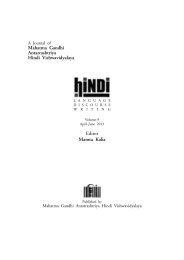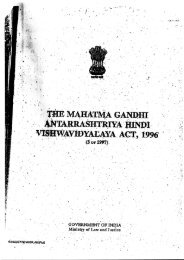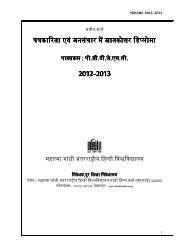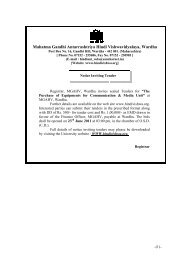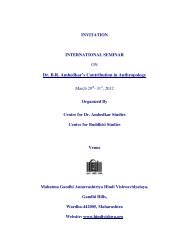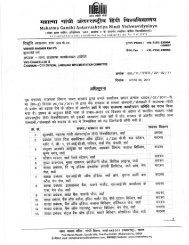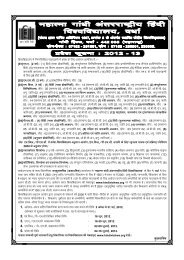A Journal of Mahatma Gandhi Antarrashtriya Hindi Vishwavidyalaya
A Journal of Mahatma Gandhi Antarrashtriya Hindi Vishwavidyalaya
A Journal of Mahatma Gandhi Antarrashtriya Hindi Vishwavidyalaya
You also want an ePaper? Increase the reach of your titles
YUMPU automatically turns print PDFs into web optimized ePapers that Google loves.
at several levels. Instances <strong>of</strong> visible<br />
violence from curbing their voices to<br />
destroying their works are easily detectable,<br />
but indirect violence and ways <strong>of</strong> silencing<br />
them are not so. The extent <strong>of</strong> this has<br />
been so immense that the author <strong>of</strong> the<br />
great text ‘Seemantani Updesh’ has been<br />
none other than an ‘invisible hindu woman’.<br />
Her name is not known till now. Is it<br />
not the sorry result <strong>of</strong> indirect violence?<br />
It is not so that women have resisted<br />
patriarchy only in Europe or India. Every<br />
nation that had patriarchy witnessed<br />
resistance. If one looks at recent past,<br />
i.e. the nineteenth century, Jiu Chen from<br />
China, Gajman Nona and Sugla from Sri<br />
Lanka, Kartini from Indonesia, Kurral ul<br />
Ain from Iran, etc. present themselves<br />
as ready instances, along with many others.<br />
It is true that they along with the urge<br />
to resist patriarchy, can also see the<br />
limitations <strong>of</strong> their struggle specific to their<br />
respective times. This legacy has to be<br />
understood without attempting to<br />
undermine or exaggerate it. To build<br />
constructively on this legacy, both its<br />
achievements and its limitations are<br />
valuable and must be owned up and<br />
discoursed upon.<br />
In our country, the Independence<br />
struggle brought women out <strong>of</strong> the confines<br />
<strong>of</strong> their households. During this, multitudes<br />
<strong>of</strong> women partook in significant social and<br />
political work. The matter <strong>of</strong> women’s<br />
position in society as a political question<br />
emerged in this period. Moving out <strong>of</strong><br />
homes, attending meetings and<br />
participating in socio-political projects is<br />
in itself a step towards empowerment.<br />
Leaders <strong>of</strong> the independence struggle must<br />
be given credit for it too. But, it must<br />
also be remembered that just like dalits<br />
and farmers, women were also merely part<br />
<strong>of</strong> the larger cause <strong>of</strong> independence, instead<br />
<strong>of</strong> it being a question <strong>of</strong> women’s liberation.<br />
Inferring, forerunners <strong>of</strong> the Independence<br />
struggle raised women’s position in society<br />
in service <strong>of</strong> their own mission, i.e., the<br />
nation’s freedom. It was a historic need<br />
to liberate women from the confines <strong>of</strong><br />
their homes and align them to the cause<br />
<strong>of</strong> the nation. That is the reason why<br />
in 1917, Sarojini Naidu led a delegation<br />
<strong>of</strong> women to meet Montesque to distinctly<br />
voice and support, specifically in their<br />
position as women, the demand for Swaraj<br />
already voiced by Congress, Muslim League<br />
and the Council. Leaders <strong>of</strong> the Freedom<br />
Movement were themselves in the grip<br />
<strong>of</strong> ‘gender’ based doctrines. They felt that<br />
men were better adept at doing certain<br />
errands for the Independence struggle as<br />
compared to women. This can be<br />
understood through the Salt Satyagrah<br />
initiated by <strong>Mahatma</strong> <strong>Gandhi</strong>. <strong>Gandhi</strong>ji used<br />
to encourage women to join in the Freedom<br />
Movement but he dissuaded them from<br />
participating in Dandi March. He felt that<br />
women would tire <strong>of</strong> the long march. Some<br />
women, including Sarojini Naidu persisted<br />
against this and insisted they march too.<br />
January-March 2012 :: 141



